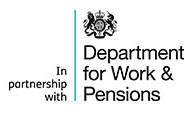Take the first step back into work with WHP Pioneer
What is WHP Pioneer?
WHP Pioneer is the latest phase of Universal Support, part of the Department for Work and Pensions’ Work and Health Programme (WHP).
It offers personalised employment support to help you into sustainable work through upskilling and training with continued support once you’re in-work.
WHP Pioneer offers support for up to 15 months plus optional in-work support of up to 6 months.
You will receive specialist one-to-one support from a dedicated Employment Specialist including:
✔ A personalised 4-week accelerator plan.
✔ Access to an employer within 30 days of starting.
✔ A wide range of health-related interventions.
✔ Job specific CV and cover letter creation.
✔ Mock interviews.
✔ Better-off calculation.
✔ Access to the iWorks digital careers platform.
✔ National Careers Service skills and job assessments.
✔ Travel planning.
✔ Ongoing in-work support.
✔ Career progression and development support once in-work.
Who is it for?
If you’re currently unemployed and not currently required to search for work as part of Universal Credit or JSA, then WHP Pioneer could help you.
To be eligible for WHP, you must also:
- Have the right to reside and enter employment in England or Wales.
- Be aged 18 or older.
- Not be on any other DWP contracted provision.
- Not have completed WHP previously.
- Not already have a job offer or be about to start work.
- Not be in any type of employment including zero hour contracts.
Specialist support is also available if you are in one of the following groups:
-
People with a disability or disabilities as defined by the Equality Act 2010.
-
Ex-offenders (someone who has completed a custodial sentence or a community sentence), or offender (someone who is serving a community sentence).
-
Carers.
-
Ex-carers.
-
Homeless people.
-
Former members of His Majesty’s (HM) Armed Forces.
-
Member of the HM Armed Forces reserves.
-
Partners of current or former Armed Forces personnel.
-
People for whom a drug/ alcohol dependency (including a history of) presents a significant barrier to employment.
-
Care leavers.
-
Refugees.
-
Young people identified as being involved or at risk of being involved in gangs or serious violence.
-
Victims of domestic violence.
-
Afghan Resettlers.
-
Ukrainian Evacuees.


